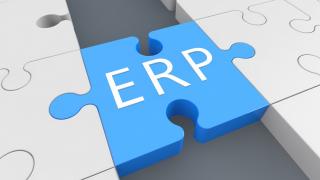
In recent years, the Fourth Industrial Revolution has moulded the future of manufacturing into a tech-centric utopia, shifting the industry focus onto human-robot collaboration, as well as improved productivity and safer working conditions.
Rather than pigeonholing itself, the Fourth Industrial Revolution is a collective term for a number of technologies and innovations, including (but not limited to) big data and autonomous plant & equipment, as well as the Industrial Internet of Things (IOT). In order for these technologies to succeed, it is essential that they are able to seamlessly interact with one another. Connectivity is a key focus of 4IR, meaning that there has to be a ‘glue’ that binds all of its elements together.
This is where ERP systems become more than just a luxury to the savvy manufacturer. Modern ERP systems have undergone an evolution in keeping with industry demands; whilst ERP software predates the advent of 4IR, the latest systems are very much designed to integrate with its technologies, providing a platform for users to analyse big data and create a connected network of smart equipment.
How Does Modern ERP Support 4IR?
ERP systems are a great first step to take in a 4IR journey.
Modern ERP systems are a great first step to take in a 4IR journey, or a way of centralising your existing smart technology. Tasked with managing the day-to-day aspects of running a business, ERP - or enterprise resource planning - is most at home within the engineering and manufacturing sectors due to its position within the supply chain. The need to communicate with lower-tier suppliers, alongside logistics operators and material stockists, makes the requirement for a seamless business process essential.
Here are some of the ways in which modern ERP systems are supporting 4IR:
- Cloud-Based: Modern ERP systems have become cloud-based, meaning that there’s no need to be in the factory to use them. This functionality enables users to access data and input commands from a remote location. It also provides the benefit of automatic updates, as well as a reduced need for physical hardware such as servers.
- Big Data Analysis: ERP systems are equipped to collect and analyse data from all steps of the production process. Big data is a key focus of the Fourth Industrial Revolution and refers to large data sets that can be used to identify areas for improvement and make informed business decisions. Often, the data sets involved are so large that a manual analysis process is impossible; ERP systems constantly mine and process this data to be understood at a glance.
- Centralisation of Plant, Equipment and Inventory: ERP systems connect your plant & equipment to identify machine availability and allocate jobs accordingly. In addition, ERP can be used to manage inventory without the need for cross-referencing multiple databases, as well as allocating material sources to completed jobs for full traceability. This centralisation is conducive to 4IR’s need for seamless connectivity.
Data Is The Blood, ERP Is The Syringe:
Read: Big Data, Better Manufacturing!
Without the input, extraction and analysis of data, 4IR practices and technologies are not possible.
Of course, the lifeblood of the Fourth Industrial Revolution is data. Without the input, extraction and analysis of data, 4IR practices and technologies are not possible and therefore, a medium needs to be put in place to enable this exchange.
ERP systems act as the syringe that inputs and extracts the required data sets, resulting in an efficient, centralised information hub that provides key metrics on all manner of manufacturing and procurement processes. For instance, an inventory management feature relies on preset parameters (i.e. the input of data), but will then be able to extract and analyse this data much faster than any given manual operation. The same can be said for ERP’s quality control and job allocation functions, which provide complex information in a simple, ‘at a glance’ format to the end user.
Ultimately, 4IR and ‘smart’ technology is rendered useless without the means for plant & equipment to communicate and exchange information. Even if you’ve yet to invest in smart technology, ERP will provide tangible business benefits to 4IR newcomers and pioneers alike.
Read: Industry 4.0 For SMEs - Where To Start?
Shaping The Future of Manufacturing:
The automated factories of the future will not be able to operate as intended without the use of a capable ERP system.
Although ERP may lack the histrionics of automation and IOT, it really is an essential element in the Industry 4.0 sphere. The automated factories of the future will not be able to operate as intended without the use of a capable ERP system, making them the backbone of cutting edge innovation within manufacturing technology.
As 4IR continues to shape the future of manufacturing, the need to have a 4IR-ready ERP system will grow. Subsequently, it’s important that businesses of all sizes consider the implementation of ERP software, whilst also understanding the wider scope of benefits that are on offer.
Read: 6 Reasons Why ERP Software Makes Sense For Small Job Shops
Considering ERP Software?
If you’re looking to invest in ERP, Shoptech’s E2 Shop System offers everything you would expect from modern ERP software. Established in 1984, Shoptech Software is a leading provider of Shop Management Software for SME manufacturers. Shoptech has been honored by Inc. magazine as one of the fastest growing companies in the U.S. for eight consecutive years. Shoptech has over 8,500 customers worldwide and is growing fast. Shoptech has forged strategic alliances with business partners, garnered recognition in business and shop trade magazines, and gained a reputation as consistently being on the forefront of technological innovations to best serve the various manufacturing markets.
